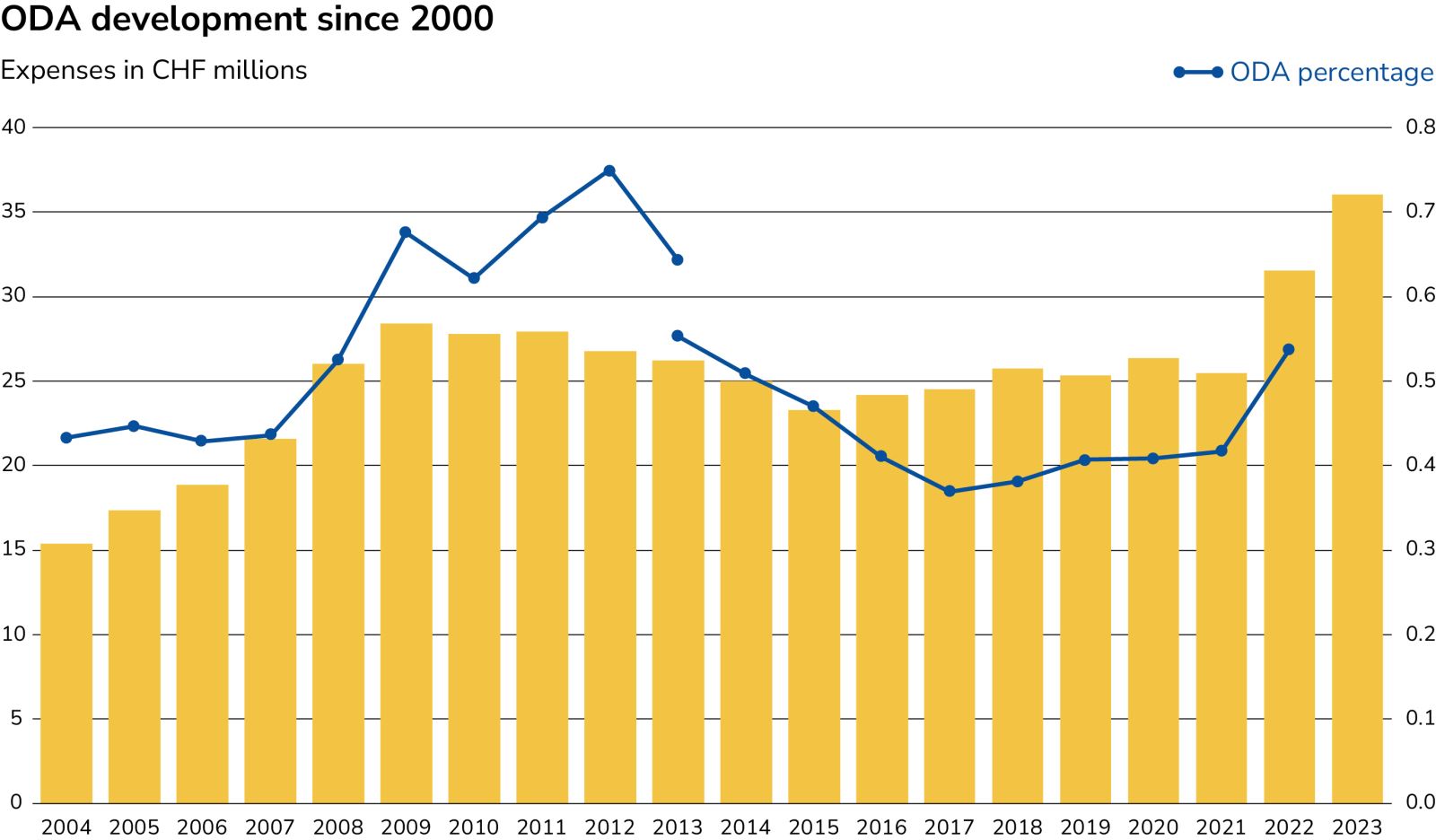Content
International Humanitarian Cooperation and Development (IHCD)
The Office for Foreign Affairs (Amt für auswärtige Angelegenheiten, AAA) coordinates International Humanitarian Cooperation and Development (IHCD) and implements it in cooperation with the Liechtenstein Development Service (LED). The IHCD Act is the legal basis for IHCD. It comprises the four categories "Emergency and Reconstruction Assistance", "International Refugee and Migration Assistance", "Bilateral Development Cooperation", and "Multilateral Development Cooperation".
IHCD is Liechtenstein's main instrument for providing the state's "Official Development Assistance" (ODA) in accordance with OECD criteria. Other ODA activities include the care of refugees and asylum seekers in Liechtenstein, humanitarian contributions by municipalities, and other contributions to international organisations. In 2023, Liechtenstein provided support for IHCD projects totalling 25.6 million Swiss francs. Together with the other ODA-relevant expenses, a total of 36.0 million Swiss francs were invested in ODA.
The four IHCD categories at a glance:
IHCD
Bilateral development cooperation
The largest pillar of IHCD is bilateral development cooperation, for which the Liechtenstein Development Service (Liechtensteinischer Entwicklungsdienst, LED) is responsible. For this purpose, the LED receives about 60 per cent of the total IHCD funds annually, which it uses primarily for development projects with local partners (southern partners) or with partner organisations from Europe (northern partners). The LED maintains project offices in Chişinău (Moldova), La Paz (Bolivia), and Phnom Penh (Cambodia). The LED is currently active in nine priority countries: Moldova, Bolivia, Senegal, Mali, Burkina Faso, Mozambique, Zimbabwe, Zambia, Tanzania and Cambodia. Thematically, the LED focuses its projects on a "sustainable food system with a focus on agroecology" and on "vocational training and employability". Furthermore, the LED supports the involvement of specialists from Liechtenstein in development projects.
Other activities include public relations and raising awareness through publications, exhibitions and educational work in schools. The cooperation between the Liechtenstein government and the LED foundation, which is established under private law, is regulated by an owner's strategy, which is supplemented and substantiated by annual performance agreements. The LED Foundation Board determines the individual projects.
Emergency and Reconstruction Assistance
Emergency and Reconstruction Assistance provides short-term and urgent assistance in the event of natural disasters, political crises and armed conflicts. The primary concern is to save human lives and protect the affected population. In addition, support is provided for the medium-term development of social structures and infrastructure to enable a rapid return to normal life. The urgency of the situation is the main criterion for Emergency and Reconstruction Assistance. There are therefore no geographical priorities. However, special attention is paid to underfunded emergencies that receive little attention from the international community.
International Refugee and Migration Assistance
International Refugee and Migration Assistance is geared towards a sustainable and comprehensive approach to managing the global refugee and migration issue. Bilateral activities are focused on the Balkan states. People in need of protection, including minorities, receive support for local integration and long-term improvement of their living conditions. The overall consideration of migration also addresses the possibilities of circular migration, readmission agreements and visa issues. At the multilateral level, compliance with international, human rights and humanitarian standards for refugees, internally displaced persons, returnees, stateless persons and other persons in need of international protection is promoted.
Multilateral development cooperation
Multilateral development cooperation finances projects of international organisations or non-governmental organisations that are acting internationally. This type of engagement is particularly suitable for global or cross-border problems for which the international community is jointly seeking solutions. In contrast to LED projects, which are primarily implemented at the local level, this approach can also be used to improve the general conditions nationally and internationally. Particular attention is paid to promoting good governance. This includes a commitment to human rights, strengthening the rule of law and democracy, and fighting corruption and international crime. In this way, the central priorities of Liechtenstein's foreign policy, especially around human rights, are additionally supported through IHCD, which in turn underscores Liechtenstein's credibility. The commitment to the increased inclusion of women in peace-building processes or the protection of children in armed conflicts is noteworthy in this context. Other priorities include the environment, sustainable development and the fight against climate change.

